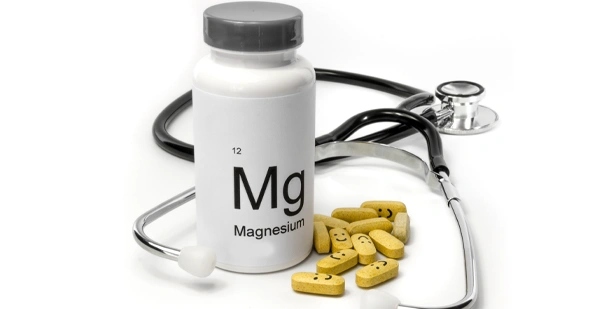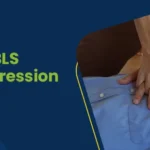Magnesium plays a role in ACLS protocols for cardiac arrest. It is suggested that magnesium improves resuscitation rates and neurologic recovery. Studies show that intravenous magnesium sulfate can be safely administered during cardiac arrest, with resuscitation rates ranging from 21% to 35%.
Magnesium depletion occurs in patients treated with therapeutic hypothermia after cardiac arrest which makes supplementation necessary. So, let us understand the role of magnesium in cardiac arrest and its long-term effects on patient outcomes.
Master ACLS Now
Get ACLS certified with confidence
What is the role of magnesium in cardiac arrest?
Magnesium plays a beneficial role in cardiac arrest in the following ways:
- It acts as an antiarrhythmic agent and helps to stabilize the heart’s electrical activity.
- Enhances atrial antiarrhythmic efficacy and reduces proarrhythmic potential.
- Magnesium improves myocardial metabolism, inhibits calcium accumulation, and reduces cardiac arrhythmias.
- It provides neuroprotection during global cerebral ischemia associated with cardiac arrest.
Read More: Acls discount code
How does magnesium affect the outcome of cardiac arrest?
Researchers have found that magnesium has a potential neuroprotective effect during episodes of critical brain perfusion after aneurysmal subarachnoid hemorrhage (SAH). In a study, patients who received intravenous magnesium sulfate had a lower risk of developing secondary infarction following episodes of delayed ischemic neurological deficit as compared to those who received isotonic saline.
Read More: ACLS Certification in California
What is the recommended dosage of magnesium for treating torsades de pointes in ACLS?
Magnesium sulfate is administered intravenously in specific dosages. The recommended dosages of magnesium sulfate for the treatment of torsades de pointes in ACLS guidelines are as follows:
For adults:
- Bolus: 1 to 2 grams of magnesium sulfate over 5 to 20 minutes.
- Infusion: 0.5 to 1 gram per hour.
For pediatric patients:
- Bolus: 25 to 50 mg/kg of magnesium sulfate over 5 to 20 minutes.
- Infusion: 5 to 15 mg/kg per hour.
Master ACLS Now
Get ACLS certified with confidence
What are the potential risks of using magnesium as a treatment?
The potential risks of using magnesium as a treatment include the following:
- Excessive intake of magnesium can lead to symptoms like diarrhea, nausea, and abdominal pain. It also causes a laxative effect which results in stomach cramps.
- It leads to symptoms such as low blood pressure, urine retention, muscle weakness, irregular heartbeat, and even cardiac arrest.
- Poor kidney function increases the risk of magnesium toxicity because the kidneys cannot remove excess magnesium from the body.
- Taking excessive amounts of magnesium is dangerous as it can lead to magnesium toxicity.
Thus, it is important to take magnesium dosages as directed by a healthcare professional.
When should you consider magnesium in managing cardiac arrest?
Magnesium plays a critical role in the management of certain types of cardiac arrest. Here are specific scenarios where it should be considered:
- Torsades de Pointes: Magnesium is highly effective in treating this specific type of polymorphic ventricular tachycardia.
- Hypomagnesemia: You can consider magnesium supplementation if low magnesium levels are suspected or confirmed.
- Digitalis Toxicity: Magnesium helps to manage arrhythmias associated with digitalis toxicity.
- Refractory Ventricular Fibrillation: In cases where standard treatments are ineffective, magnesium helps stabilize the heart rhythm.
- Pre-eclampsia and Eclampsia: During cardiac arrest associated with these conditions, magnesium is used for its neuroprotective and anti-seizure properties.
How does magnesium compare to other antiarrhythmic medications in cardiac arrest?
Magnesium is used in cardiac arrest mainly for specific conditions like Torsades de Pointes, hypomagnesemia, and digitalis toxicity. It stabilizes myocardial cell membranes but has limited use for broader arrhythmia management. Compared to other antiarrhythmic drugs like amiodarone, lidocaine, epinephrine, and atropine, magnesium is effective for its targeted uses but is a less versatile antiarrhythmic medication. Other medications offer broader arrhythmia control but come with their advantages and side effects.
Master ACLS Now
Get ACLS certified with confidence
Which cardiac arrhythmias does magnesium effectively treat?
Magnesium is effective in treating the following types of cardiac arrhythmias:
- Torsade de pointes tachycardia
- Digitalis-induced cardiac arrhythmias
- Monomorphic ventricular tachycardia
- Multifocal atrial tachyarrhythmia
Research shows that magnesium sulfate alone was effective in 56% of the study group whereas 74% of the control group were responsive to standard antiarrhythmics.
Read more: Effects Of Illegal Drugs On the Heart
Conclusion
Magnesium plays a crucial role in ACLS protocols for cardiac arrest. It acts as an antiarrhythmic agent and stabilizes the heart’s electrical activity. Magnesium in cardiac arrest is effective in treating specific types of cardiac arrhythmias such as torsade de pointes, digitalis-induced arrhythmias, monomorphic ventricular tachycardia, and multifocal atrial tachyarrhythmia. Thus, understanding the recommended dosages, and indications is important for effective management of cardiac arrest.







